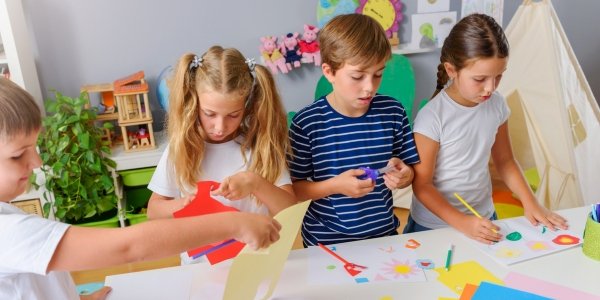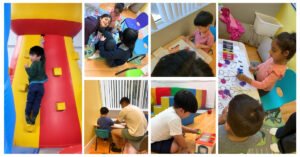As summer camp season approaches in Burnaby, BC, parents of children with unique developmental needs face the challenge of ensuring a smooth and positive transition for their kids. At KidStart Pediatric Therapy, we understand that preparation is key to maximizing your child’s camp experience. Our expert pediatric therapists have compiled a comprehensive checklist and communication guide to help parents prepare effectively for Summer Camp 2025, ensuring your child’s safety, comfort, and growth.
Understanding Your Child’s Needs: The Foundation of Preparation
Every child’s developmental profile is unique, especially those receiving pediatric occupational therapy, speech therapy, or behavioral consultation. Before camp begins, parents should collaborate with their child’s therapists to identify specific needs related to sensory processing, communication, social skills, and emotional regulation.
According to data from Burnaby’s pediatric therapy community, early intervention and tailored supports significantly improve children’s adaptability in new environments, such as summer camps.
Key Areas to Assess with Your Therapist:
- Sensory sensitivities and coping strategies
- Communication preferences and augmentative tools
- Social interaction skills and peer engagement
- Emotional regulation techniques and triggers
- Physical abilities and safety considerations
Having a clear, written summary of these areas will guide camp staff and ensure consistency of care.
Proactive Communication: Building a Triangular Partnership
Effective communication between parents, therapists, and camp staff is critical for a successful summer camp experience. Research from the American Camp Association highlights that proactive outreach, timely responses, and active listening form the cornerstone of positive camp environments.
Best Practices for Communication:
- Pre-Camp Orientation: Arrange meetings or calls between therapists, parents, and camp directors to discuss your child’s individualized needs and accommodations.
- Written Care Plans: Provide detailed, easy-to-understand care plans that include strategies, emergency protocols, and contact information for therapists.
- Regular Updates: Establish preferred communication channels (phone, email, camp apps) for ongoing updates during camp sessions.
- Feedback Loops: Encourage camp staff to share observations and parents to provide feedback to therapists, fostering continuous adjustment and support.
At KidStart Pediatric Therapy, we emphasize family-centered care and collaboration, ensuring that parents are integral to every step of the process.
Preparing Your Child Emotionally and Practically
Transitioning to camp can be overwhelming for children with developmental challenges. Preparation involves both emotional readiness and practical skill-building.
Emotional Preparation:
- Use social stories and visual schedules to familiarize your child with camp routines.
- Practice coping strategies for anxiety or sensory overload.
- Role-play common camp scenarios to build confidence.
Practical Skills:
- Encourage independence in self-care tasks like dressing, toileting, and eating.
- Build fine and gross motor skills relevant to camp activities.
- Reinforce communication skills, including using assistive devices if applicable.
KidStart’s pediatric occupational therapists specialize in these areas, providing targeted interventions that empower children to thrive in new settings.
Safety and Health Considerations
Safety is paramount. Ensure all medical and behavioral information is up-to-date and shared with camp staff. This includes allergy information, medication schedules, and emergency contacts.
Tips for Safety:
- Provide camp staff with clear instructions on medication administration.
- Discuss sensory or behavioral triggers and calming techniques.
- Confirm that camp staff are trained or briefed on your child’s specific needs.
Burnaby’s local health data indicates that camps with well-prepared staff and clear protocols reduce incidents and improve camper well-being.
Leveraging Technology for Seamless Communication
Modern camps often use apps and digital platforms to facilitate communication. Parents should inquire about available tools that provide daily updates, photos, and direct messaging with counselors.
Post-Camp Follow-Up: Supporting Continued Development
After camp, parents should collaborate with therapists to review the experience, celebrate successes, and address any challenges encountered. This feedback loop is essential for ongoing developmental progress and for planning future camp participation.
Ready to Put This Checklist into Action?
Enroll in KidStart Pediatric Therapy’s Summer Camp 2025!
If you’re looking for a summer camp that’s expertly designed for children ages 5–7, KidStart Pediatric Therapy’s Summer Camp 2025 is the perfect fit. Our camp provides a structured, supportive environment where your child can build social skills, confidence, and joyful friendships—all guided by experienced pediatric therapists.
Camp Highlights:
- Skill Focus:
- Social communication
- Play-based developmental skills
- Emotional regulation
- Confidence and independence
- Small group ratios for personalized attention
- Guided play, group interaction, and cooperative activities
- Professional oversight from our multidisciplinary therapy team
Camp Dates:
- July 7th–9th, 14th–16th
- August 11th–13th, 18th–20th
- Monday–Wednesday, 9:00 AM–11:30 AM
- Location: KidStart Pediatric Therapy, #206–1899 Willingdon Ave, Burnaby, BC
Daily Schedule Includes:
- Circle time, social skills activities, gym/movement, snack & social talk, story time, and goodbye routine
- Carefully crafted routines to support transitions and maximize learning opportunities
Registration Details:
- Total hours: 18 per session
- Cost: $920 (includes materials & snacks)
- Small group size: 4–6 children
- Professional therapist-led sessions
Secure your spot today!
- Call: (604) 336-6885
- Email: info@kidstartpediatrictherapy.com
Spaces are limited and fill quickly—early registration is encouraged!
Give your child the best start to summer with KidStart Pediatric Therapy’s Summer Camp 2025, where growth, confidence, and joy are at the heart of every day. If you have any questions about our camp or how we support your child’s transition, don’t hesitate to reach out to our team.
Make this summer the season of growth and new friendships—join us at KidStart Pediatric Therapy Summer Camp 2025!
FAQs
- What are the benefits of attending a pediatric therapy summer camp?
Pediatric therapy summer camps provide children with opportunities to practice social, communication, and motor skills in a supportive group setting, promoting independence and confidence beyond traditional therapy sessions. - How do pediatric therapists support children with sensory processing challenges at camp?
Therapists incorporate sensory-friendly activities and individualized coping strategies to help children regulate sensory input, reducing anxiety and enhancing participation in camp routines. - Are parents involved in planning their child’s camp experience?
Yes, KidStart Pediatric Therapy emphasizes family-centered care, involving parents in pre-camp planning and ongoing communication to tailor supports and ensure a positive camp experience. - What should parents bring to the camp for their child?
Parents should provide any necessary medications, comfort items, and communication aids, along with appropriate clothing and snacks if not provided by the camp, to support their child’s needs. - How does KidStart Pediatric Therapy measure progress during the camp?
Our therapists observe and document each child’s engagement and skill development daily, sharing feedback with parents to highlight achievements and areas for continued growth.







